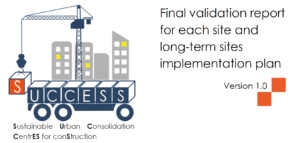The SUCCESS project targeted the construction industry as a sector with a major impact on city logistics which has an un-exploited potential of improvement as regards the efficiency of trips associated with the delivery of goods, waste and service in EU cities. The SUCCESS project goal is to provide tools and answers to the challenges in urban freight transport and to introduce more resource-efficient, more environmentally friendly, safer and seamless supply chain innovations.
Future urban policies
The final report “Final validation report for each site and long-term sites implementation plan” aims to identify how construction logistics issues could be included into future urban policies in a long-term perspective taking into account public and private stakeholder engagement, time plan, communication strategy, barriers and actions to be implemented.
This deliverable is based on the findings of the earlier report “Solutions comparison and evaluation report merging results of the four sites and related benchmarking”, which validated the solutions tested in each pilot site. In each pilot city, Construction Consolidation Centres (CCCs) were identified as key elements of an innovative model for the supply chain for the construction sector.
Successful CCCs
The new report presents trends, drivers (enabling factors) and challenges of construction logistics today and it defines an implementation plan for the introduction of the optimisation measures in the cities of the future, and specifically of the CCC as the main element of a new construction supply chain.
The report identified barriers for successful CCCs: the difficulty to evaluate the financial sustainability and market for the CCC initiatives, planning difficulties (including land availability, location, price and lack of integrated supply chains), operations difficulties (lack of innovation, buying procedures and outsourcing) and construction logistics is still seen as a niche topic. The sense of urgency is lacking.
The report highlights the enabling factors (city logistics regulations, standards and training, competences, collaboration) and the barriers that support the introduction and the sustainability of construction logistics measures and CCCs in the long run.
The reports explains how the findings, tools and results of SUCCESS can support the definition of a long-term plan, which shall be specific to the construction sites considered and the cities that host them.
Findings
An implementation plan for city logistics’ optimisation requires skills, knowledge and important preparatory work in order to activate the enabling factors and remove the barriers.
With specific regards to CCCs, it is clear that that the successful implementation of a CCC must be evaluated on a case-by-case basis, and depends on many variables. In fact, CCCs can be financially sustainable, even without public help, but the initiative must be located in a context that is favourable to its development (in terms of geographical location, chosen business model, political environment etc.). The feasibility and profitability of a CCC highly depends on the possibility to reach economies of scale to compensate the extra cost, so the presence of big construction sites or the choice of a CCC serving several sites seem to be the most financially sustainable in the long-term.
It is important to highlight that construction logistics is an inherently complex segment with a multitude of stakeholders with different interests. The transition to a more optimised logistics will be pushed by many, and sometimes contrasting, trends such as the need for decarbonisation but also the demand for new buildings in city centres.
Source: SUCCESS

